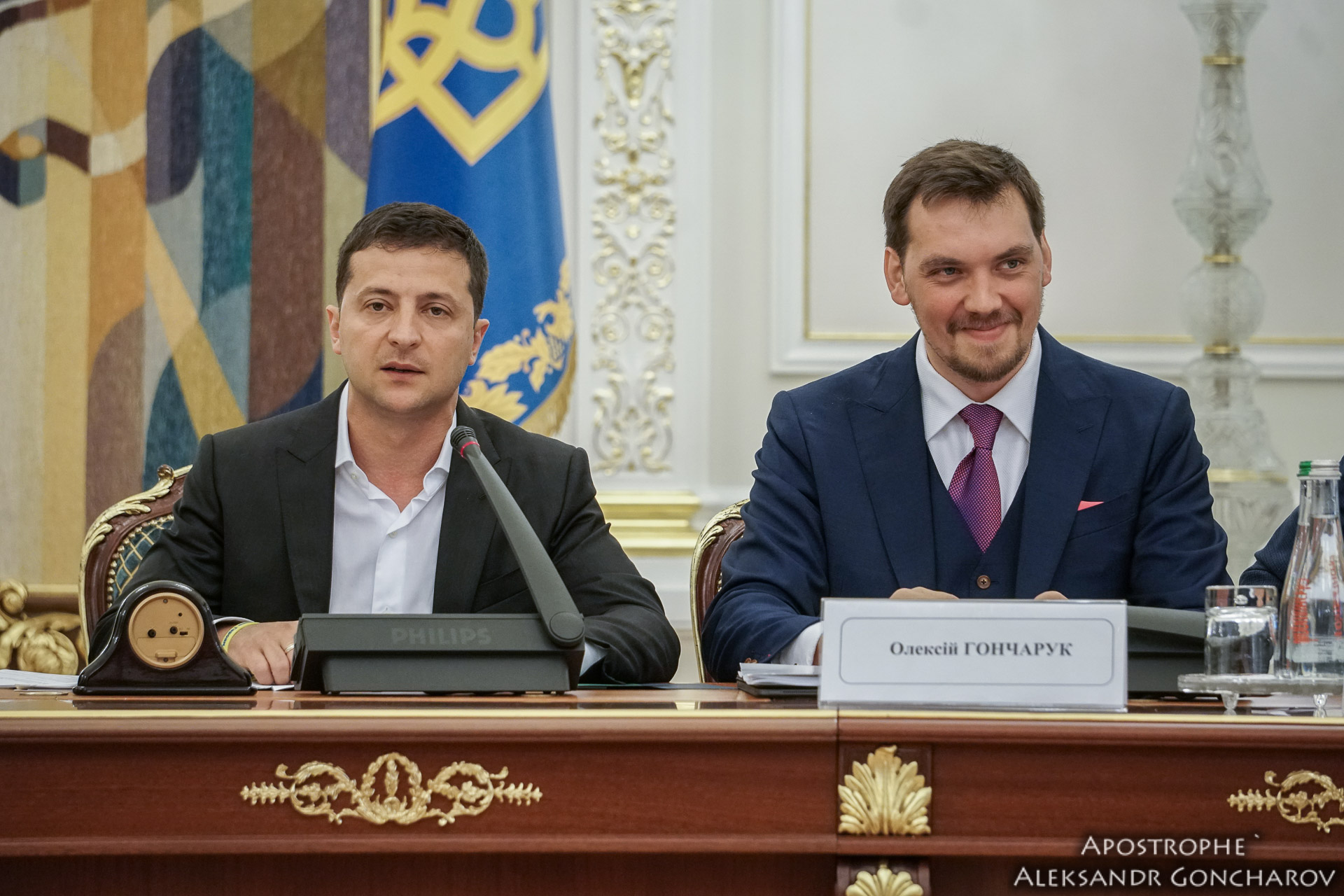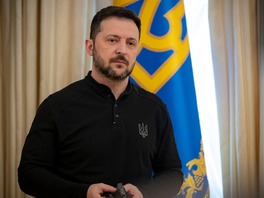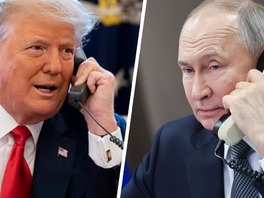Early parliamentary elections gave the “Servant of the People” party an unprecedented for Ukraine result – 254 MPs, meaning one party can establish a ruling majority on its own. Together with a majority in parliament, comes an obvious pro-Zelensky government with internal structural changes. The pro-presidential Parliament completed the process of reloading the executive power, thus giving the new government an opportunity to single-handedly implement reforms in Ukraine. As “Servant of the People” won’t need much support from other political forces in order to push through their agenda, Ukrainian experts are warning that the threat of usurpation of power is a real one. In order to predict the future activities of this “green” political force, it’s necessary to analyze the key stakeholders and influencers in the new Ukrainian parliament and government.
It’s obvious that the main political power in Ukraine’s new Verkhovna Rada is the one of Volodymyr Zelensky and his “Servant of the People” party. At the same time, however, the VR and the new Ukrainian government have become the battle ground of numerous political forces, subjugated to the will of Ukraine’s most powerful politicians and oligarchs. The parliamentary elections have clearly shown who managed to come out of the elections with a winning hand, and who will be facing an uphill battle for power in the next five years.
The following figures are the ones who have managed to maintain or extend their grip on the current political establishment:
Volodymyr Zelensky
The VRU of the 9th convocation will mostly be influenced by Volodymyr Zelensky and his companions, the main one of which is Andriy Bohdan. The latter personally selected candidates for the “Servant of the People” party which managed to obtain 254 mandates. Zelensky and Bohdan will attempt to obtain a constitutional majority (300 votes) by luring the self-nominated candidates in a coalition with them. Although “Servant of the People” is Zelensky’s party, the MPs are subjugated to various influences. All in all, Zelensky can only count on 45 MPs who will stay loyal to him no matter what. The rest of the 254 MPs of the “Servant of the People” party are the people who came in through ties to “Studio Kvartal-95”, friends and family.
In the new government, Zelensky has managed to plan his following pawns:
- Vice Prime Minister, Minister of Digital Transformation – Mykhailo Fedorov;
- Minister of Foreign Affairs – Vadym Prystaiko;
- Minister for Veterans Affairs – Oksana Koliada;
- Minister of Health – Zoriana Skaletska.
Ihor Kolomoiskyi
Among representatives of the oligarchic groups, the greatest influence on the new Parliament will be exerted by Ihor Kolomoiskyi and his partner Hennadiy Boholiuv. Zelensky and Kolomoiskyi used to be business partners and the latter actively supported the president during his campaign. The parliamentary elections have now shown that Kolomoiskyi’s people have entered the Parliament both in the “Servant of the People” party list and among MPs elected in single-member constituencies. Kolomoiskyi most likely wishes to avoid the limelight and will therefore rather use “his” people – especially Andriy Bohdan – to actively lobby his interests for him. As Kolomoiskyi has a fundamental influence on Zelensky’s team and the “Servant of the People” party, he is likely to support on the “Servant of the People”’s single-party majority to push through new bills, such as cancellation of parliamentary immunity, appointment of loyal ministers, etc. Kolomoiskyi manages to have a total of 27 loyal MPs on his camp.
With regards with his influence on the government, the following ministers can be linked to Kolomoiskyi:
- Minister of Finance – Oksana Markarova
- Minister of the Cabinet of Ministers – Dmytro Dubilet;
- Minister of Social Policy – Yulia Sokolovska;
- Minister of Culture, Youth and Sports – Volodymyr Borodyanskyi.
Viktor Pinchuk
In addition to “his people” in the “Servant of the People” faction, Pinchuk also has MPs of other political factions in his pocket, as well as some self-nominated candidates. He has a particularly strong influence on the “Holos” party faction. He also has a representative for his interests in the “Batkivshchyna” party. While it has been a while since the Ukrainian businessman Viktor Pinchuk was considered one of the key actors in Ukrainian financial-industrial groups, he has obtained a substantial influence on Volodymyr Zelensky. In fact, Zelensky’s public association with the notorious oligarch Ihor Kolomoiskyi – as well as aggressive lobby for the former’s interests in the president’s inner circles – has pushed Zelensky towards a more “acceptable” oligarch, being Pinchuk. Pinchuk is trying to weaken Kolomoiskyi’s influence on Zelensky. Through his influence, Pinchuk hopes to lift the moratorium on the land market, buy up key state-owned enterprises under the disguise of privatization (e.g., “Ukrzaliznytsya”, “Turboatom”, “Centrenergo”, the gas transportation system, etc.), and fight corruption. Pinchuk’s influence extends to only 6 MPs in parliament, yet he’s generally liked and uncontroversial, making him one of the few oligarchs without an obvious target on his back.
Serhiy Lyovochkin
Ukrainian politician and businessman Serhiy Lyovochkin holds the 5th place on the “Opposition Platform – For Life” party list. Currently, Lyovochkin has a total of 23 MPs with loyal adherence to him.
Arsen Avakov (Minister of Internal Affairs)
Avakov has been an active actor of Ukrainian politics since the early 2000s and currently holds the position of Minister of Internal Affairs.
Avakov has a total of 28 loyal MPs in the Verkhovna Rada.
In the government, Avakov obviously holds control over the Ministry of Internal Affairs. Other than that, he also has loyalty of two other newly-appointed ministers:
- Minister of Defense – Andriy Zahorodniuk;
- Minister of Infrastructure – Vladyslav Krykliy.
A complete separate stakeholder whose influence is only exerted in government, but not in parliament is Oleksiy Honcharuk:
Oleksiy Honcharuk (Prime Minister)
Honcharuk is the youngest Prime Minister in Ukraine’s history. Honcharuk has influenced Zelensky in the appointment of ministers and has managed to guide the following people in a minister position:
- Vice Prime Minister of Ukraine for European and Euro-Atlantic Integration – Dmytro Kuleba;
- Ministry of Economic Development and Trade - Tymofiy Mylovanov;
- Minister of Energy and Environmental Protection – Oleksiy Orzhel;
- MinisterofJustice - DenysMaliuska;
- Minister of Education and Science – Hanna Novosad:
- Minister of Regional Development, Construction, and Communal Living – Olena Babak.
It’s clear that these parliamentary elections have completely re-established the balance of powers in the current governmental and parliamentary systems. Zelensky, as a new-comer to the political game – has established a Copernican revolution in which the gravitation of powers now circles around him and his fresh-faced team. Kolomoiskyi – through both Zelensky and his other political puppets – has established a firm hand in the current rule of power which allows him certainty and stability for the next five years. Pinchuk remains well-liked and stable, with a stable 6 MPs on his side. This is substantial growth in comparison with the sole MP he had in the previous parliament. Most valuably though, he remains in good contact with nearly all political parties and has yet to discredit himself heavily enough to significantly impact his status quo. Lyovochki’s influence remains, though will be a limited one, for now. Finally, Avakov manages to safeguard a substantial number of MPs on his team, together with influence in three important ministries.
Where there are winners, there are also those who have suffered in territorial extension of their power. The second group of stakeholders contains those who have seen their influence shrink and/or find themselves targeted by the first group:
Petro Poroshenko
The 5th Ukrainian President and oligarch, Petro Poroshenko, has managed to surround himself with a group of MPs. He has put himself as the No. 1 on the party list of “European Solidarity”. Poroshenko, with 27 seats in parliament, is facing both a threat in public image and a political beating with a serious reduction in influence. He has currently become the “underdog” in Ukrainian politics, with whom very few are eager to cooperate. Adding to this, he’s currently under investigation in 14 criminal cases, whose inquiry is led by the State Investigation Bureau.
Viktor Medvedchuk
Medvedchuk Viktor Volodymyrovych is No.3 on the “Opposition Platform – For Life” election list. He is a crony of the Russian President Volodymyr Putin, mastermind of the union of Yuriy Boiko and Vadym Rabinovych in the “Opposition Platform – For Life!” project, independent from the “Opposition Bloc”. He is deemed to have three TV channels under his control – “NewsOne”, “112 Ukraine” and “ZIK”, all of which are officially owned by Medvedchuk’s business partner Taras Kozak. Viktor Medvedchuk returned to politics after a long pause under the presidency of Petro Poroshenko. The latter was accused of partnership with Viktor Medvedchuk, but firmly denied these allegations. Viktor Medvedchuk is seen as an informal communication channel between Ukraine and Russia. Medvedchuk admitted that he ran his business in the Russian Federation, including the annexed Crimea, via his wife. Mass media also call Medvedchuk a monopolist of diesel fuel and liquefied gas imports from the Russian Federation. Medvedchuk currently has a total of 9 MPs in parliament.
Rinat Akhmetov
Oligarch Rinat Akhmetov has lost influence and can currently only rely on 7 MPs in the new Rada.
The balance of power in Ukrainian politics has clearly switched and been subjected to significant changes. Volodymyr Zelensky and his close entourage has become one major stakeholder in the new political establishment, with its decisive influence on the “Servant of the people” faction and a government which is headed by Oleksiy Honcharuk. His main antagonists are Petro Poroshenko and Viktor Medvechuk, as Zelensky will continue to try and nullify their political weight. Despite his own faction making it into Parliament, Poroshenko has lost a lot of political influence in the last elections. Adding to this political beating, Poroshenko is consistently fighting off attacks by the State Bureau of Investigations, which is investigating over 14 criminal cases against him. Medvechuk, in the meantime, sees Zelensky as a superfluous, sometimes even harmful, element in Ukraine’s relations with the Russian Federation. Since Zelensky is ready to engage in direct dialogue with Moscow, he doesn’t need any toxic mediators like Medvedchuk.
Zelensky has enabled a Copernican revolution, in which the gravitation of powers now circles around him and his fresh-faced team.
The second most influential stakeholder in the status quo is Igor Kolomoiskyi, who, in addition to “his” people in the “Servant of the People” faction, also exerts influence over at least four other MPs. Adding to that, he also claims influence over at least four ministers in the current government. His main business competitor, Rinat Akhmetov, finds himself in a weakened position for the first time in a very long while. Akhmetov has currently next to no influence on the decision-making process in both the parliament and the government. He also has no way of exerting influence over Zelensky. In order to improve, or even expand, his business empire, Akhmetov is going to try to take advantage of Kolomoiskyi in one way or another. Akhmetov might be a business competitor, but when it comes down to power, Kolomoiskyi’s main competitor is Viktor Pinchuk, who has both a direct influence on Zelensky and on the parliamentary decision-making process in general. Lastly, Kolomoiskyi will head into conflict with Poroshenko, as he’s set on repaying the latter for his “de-oligarchization” attempt.
Arsen Avakov remains in a position of power and will continue to be a powerful stakeholder in Ukrainian politics. He has his people in the “Servant of the People” faction and can potentially influence at least two other ministers in the current government. It’s also important to keep in mind that he can exert influence on the “National Corps” and on other nationalist forces. Poroshenko will remain his main opponent, in continuation of their past interactions.
Lastly, Sergei Lyovochkin also manages to maintain his grip on parliament. Even more so, he’s managed to expand his group of influence in parliament, in comparison to the 8th convocation. His MPs are now mainly concentrated in “Opposition Platform – For Life”, over which he shares influence with Viktor Medvedchuk. However, it must be kept in mind that there will be a possible conflict between Lyovochkin and Medvedchuk exactly because of this reason, as they have very little in common aside for the political party they share. Even more so, they have completely opposite views on a number of key issues. One likely future scenario will be a split within the “Opposition Platform – For Life” faction and the subsequent formation of a joint deputy group between Akhmetov and Lyovochkin.





